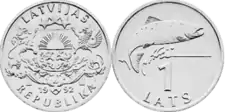nauda
See also: naudā
Latvian

Nauda

Nauda
Etymology
From Proto-Baltic *naudā-, from Proto-Indo-European *newd-, *nowd- (“to seize, to take for use”), from a stem *new-, *now- (“to make a sudden gesture; to wave, to beckon”) with an extra d. The semantic evolution was presumably “(something) taken for use, for benefit” > “property” (including also animals, cattle) > “money” (compare Latin pecus (“sheep, cattle”), pecūnia (“property, money”)). Cognates include Lithuanian naudà (“benefit, validity, utility; property”), Gothic 𐌽𐌹𐌿𐍄𐌰𐌽 (niutan, “to achieve, to get, to enjoy”), Old English notu, nytt, Old High German nuz (“use, utility”) (German nutzen (“to serve, to use”)), Old Norse naut (“cattle”).[1]
Noun
nauda f (4th declension)
- money (specific good used as a generally accepted means of exchange)
- metāla, papīra nauda ― metal, paper money
- naudas maks ― wallet (lit. money wallet)
- sīka nauda, sīknauda ― small money (= change)
- liela nauda ― big money (i.e., a large amount)
- krāt naudu ― to save money
- izdot, tērēt naudu ― to spend money
- pelnīt naudu ― to earn, to make money
- aizdot, aizņemties naudu ― to lend, to borrow money
- maksāt skaidrā naudā ― to pay cash (lit. in clear money)
- (iz)mainīt naudu ― to change money (into smaller pieces)
- (ap)mainīt naudu ― to change money (into another currency)
- viltot naudu ― to falsify money
- spēlēt kārtis uz naudu ― to play cards for money
- naudas sods ― a money penalty, a fine
- naudas ekonomiskās funkcijas ― the economic function of money
- naudas apgrozība ― the circulation of money
- naudas sistēma ― monetary (lit. money) system
- preču vērtības naudas izteiksmē ― the value of goods in terms of money
- payment, fees (money given or paid for a purpose)
- biedru nauda ― membership fees (lit. members' money)
- īres nauda ― rent (lit. rent money)
- atvaļinājuma nauda ― holiday pay
- apdrošināšanas nauda ― insurance payment
- kabatas nauda ― pocket money
- dienas nauda ― daily allowance, per diem (lit. day money)
- slimības nauda ― sickness money (i.e., sick pay, money given to sick people)
- zieda, ziedu nauda ― flower money (= money traditionally donated by guests of a wedding, baptism, or funeral, to the newlyweds, to the newborn, or to the relatives of the deceased)
Declension
Declension of nauda (4th declension)
| singular (vienskaitlis) | plural (daudzskaitlis) | |
|---|---|---|
| nominative (nominatīvs) | nauda | — |
| accusative (akuzatīvs) | naudu | — |
| genitive (ģenitīvs) | naudas | — |
| dative (datīvs) | naudai | — |
| instrumental (instrumentālis) | naudu | — |
| locative (lokatīvs) | naudā | — |
| vocative (vokatīvs) | nauda | — |
Derived terms
References
- Karulis, Konstantīns. 1992, 2001. Latviešu etimoloģijas vārdnīca. Rīga: AVOTS. →ISBN.
Norwegian Nynorsk
This article is issued from Wiktionary. The text is licensed under Creative Commons - Attribution - Sharealike. Additional terms may apply for the media files.